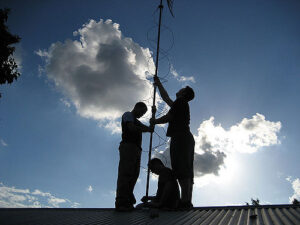Blog post titled “Community Wireless Networks Address Missed Connections: “Access” as Digital Insurgency (Pt. 2)” for Tagging the Tower

Introduction
This is Part 2 of a two-part blog post series exploring the efforts of 3 urban-based community wireless networks (CWNs) – NYC Mesh, Equitable Internet Initiative (Detroit), and PeoplesOpen.net (Oakland). The aims of these grassroots efforts are provide neighbors with internet access.
Part 1 explored the expanded notions of access and inclusion these CWNs employ in building out their community and technical networks. This inquiry ultimately revealed an inherent reworking of social, material, economic and political relations by CWNs in ways that challenge the dominant capitalocentric relations of power that govern internet access more broadly.
“In sum, CWNs’ create a new digital economy that is shared, co-owned, and managed by members of the CWN. They employ non-discriminatory definitions of “who” can be a community member. They rely on and adapt the built environment in building their community. Their existence as a community brings into being an example of a community enacting internet access as a human right.”
Part 2 continues this inquiry, further exploring the potentiality of CWNs through the active reworking of relationships and relationship-building processes undertaken by one Detroit-based CWN – the Equitable Internet Initiative.
Pt 2: Community Wireless Networks: “Access” as Digital Insurgency
Detroit’s centrality to the technological revolution of the late 19th C/early 20th C seems indisputable. Nicknamed “Motor City”, Detroit was famous for Henry Ford’s first automobile test drive and the assembly line which revolutionized manufacturing broadly. Moreover, the city was home to the Big Three – Ford, General Motors, and Chrysler – which were considered to be the most successful auto industries in the world at the time (1).
In contrast, Detroit seems left behind by the technological revolution underway today. According to a 2015 report by the FCC, 40% of Detroit residents lack broadband access entirely, 57% lack hardline or fixed access (meaning they can access from mobile devices and available WI-FI networks), and 70% of school-aged children have no Internet access at home. At sixty-three percent, these trends are more pronounced for lower income households; and yet cost is only part of the issue (2). Lack of access is also the result of a lack of interest and effort by Big Telecom companies who have abandoned dark fiber optic cables that could supply access to many (3). To the extent that internet access is increasingly vital to managing, navigating and participating in life in the 21st C – including completing class assignments and employment tasks – these trends threaten old and new generations of Detroiters while compounding historic and persisting class and racial inequality (4).
It’s these trends that led the FCC to conclude that Detroit’s digital divide is among the most severe in the country. However, a closer look at community-based responses suggests that Detroit residents are once again – and maybe more so – leading the way.
The Equitable Internet Initiative (EII) is …
Continue Reading: Community Wireless Networks Address Missed Connections: “Access” as Digital Insurgency (Pt. 2) – GC Digital Fellows
Posted on: March 27, 2019